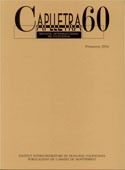Types of irony in Josep Maria de Sagarra’s lyric poetry
DOI:
https://doi.org/10.7203/caplletra.60.7942Keywords:
irony, Josep Maria de Sagarra, pure poetry, surrealism Abstract
Abstract
Abstract: This paper analyses the poetry that Josep Maria de Sagarra wrote during the twenties and thirties —excluding El comte Arnau, Poema de Nadal and his satirical poetry— to reveal the deep reasons that favoured the ironic play. A clear difference in the poetry written in each decade is highlighted, in regard to a change in his personal circumstances and a sensitivity displayed towards new aesthetics. In 1920s poetry, irony, used as a defence, had to coexist with the intention of poetic purification, whereas in his 1930s poetry the impact of surrealism and the contrast caused by the knowledge of new lands perceived as strange provide new reasons for distance.
Key words: irony, Josep Maria de Sagarra, pure poetry, surrealism.
 Downloads
Downloads
Downloads
Published
How to Cite
-
Abstract356
-
PDF (Català)252
Issue
Section
License
Authors submitting work to Caplletra for publication must be the legitimate holder of the usage rights. Legitimacy for the purposes of publishing the work must also include images, tables, diagrams and any other materials that may complement the text, whether they are the author of such material or not.
Copyright: on publishing their work in the journal, the author grants Caplletra. Revista Internacional de Filologia usage rights (reproduction, distribution and public communication) for both the paper printed version and for the electronic version.
All work published in Caplletra is covered by the Creative Commons license type Attribution-NonCommercial-NoDerivatives 4.0 (CC BY-NC-ND 4.0).
RESPONSABILITY
Caplletra. Revista Internacional de Filologia does not necessarily identify with the points of view expressed in the papers it publishes.
Caplletra. Revista Internacional de Filologia accepts no responsibility whatsoever for any eventual infringement of intellectual property rights on the part of authors.






